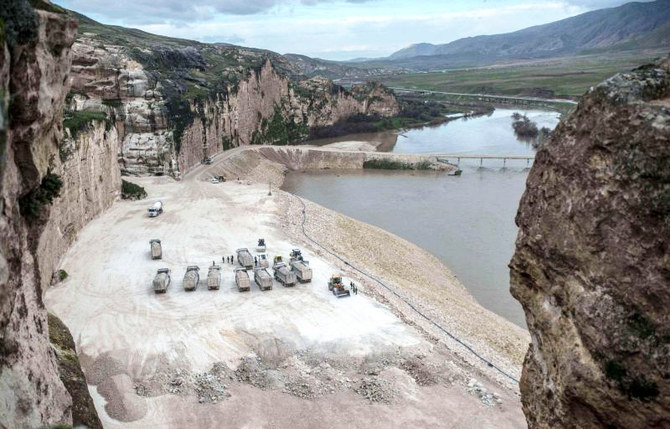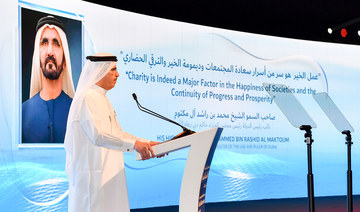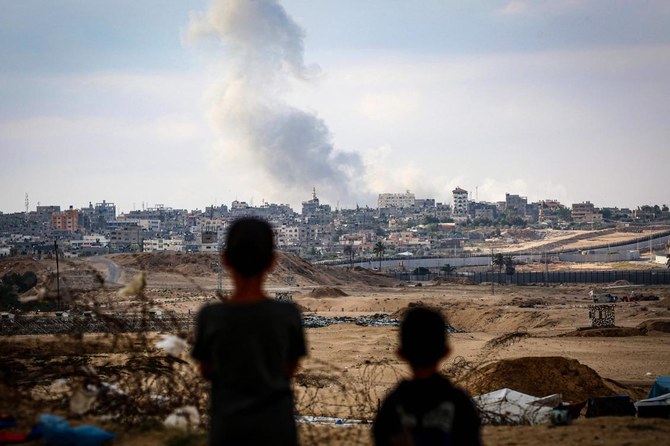DUBAI: In the Middle East and North Africa (MENA) region, access to freshwater is a perennial quest.
Most countries have a limited supply of the precious resource, which is also under severe stress due to arid conditions, population growth, poor infrastructure and overexploitation.
Large expanses of MENA are hot and dry, with only two percent covered by wetlands, so water supply is poor to begin with. To compound the problem, countries are placing increased demands on their limited reserves.
Against this backdrop, a report conducted jointly by Good Judgement, a geopolitical and geo-economic forecasting entity, and the Dubai-based Arab Strategy Forum has tried to find out if water scarcity would heighten future security risks in the region.
The study, which looked at 11 global megatrends and forecasts for the next decade, presented findings by a group of “superforecasters” from around the world, who have proven to be “30 percent more accurate than 4,300 members of the US intelligence community.”
According to the research, the overall probability that water scarcity would act as a pivot point in one or more regional conflicts over the next 10 years was fairly small, at 8 percent.
Kerry Anderson, a political risk consultant, says water concerns in the MENA region are more likely to stoke internal civil unrest and “exacerbate” other issues than cause cross-border conflict.
Describing water scarcity as potentially a “contributing factor in the escalation of hostilities” regionally, the Good Judgement report put the likelihood of a conflict between Jordan and Israel at only 1 percent.
The chances of war between Turkey and Iraq or Egypt and Ethiopia were both put at 3 percent, although the latter was considered to be among the more probable ones.
“(While) Egypt against Ethiopia is the only case where a more powerful downstream country may lose water, the report never says that a conflict may emerge considering the significant drought and deteriorating economic situation in Egypt,” Anderson told Arab News.
With regard to the tensions between Turkey, Iraq and Syria, Anderson said water disputes were unlikely to be the cause of any future conflict involving the three countries.
“Iraq’s government and military are not currently capable of launching the type of war against Turkey that would be necessary to force Turkey to change its policies,” she added.
Anderson also points out that objections by Jordan and Iraq, to what they see as disproportionate extraction of water from shared resources respectively by Israel and Turkey, are unlikely to escalate into a conflict.
“The risk of a war over competing claims might be low, but the risk of water shortages and disputes contributing to political instability, protest movements and economic challenges is far greater.”
For instance, rural families could be forced to leave unproductive farms and migrate to cities, which would contribute to increased social pressures on communities. In combination with corruption, water scarcity could worsen “inequalities,” fueling unrest, Anderson said.
The risks for MENA countries due to water scarcity cannot be overstated. A report released last year by the World Resources Institute (WRI) said 12 of the 17 most water-stressed countries in the world were located in the MENA region.
In the WRI’s “Aqueduct Water Risk Atlas,” Qatar was ranked first, followed by Israel, Lebanon, Iran, Jordan, Libya, Kuwait, Saudi Arabia, the UAE, Bahrain and Oman.
The scale of the challenge facing MENA governments can be gauged from the fact that in 2017, 17 out of 22 Arab League nations had more than half their populations living in urban areas.
Regional experts say the growth of urban areas in MENA countries is inevitable given that rural living was nearly impossible on arid land with marginal environments that could barely support subsistence agriculture.
The combination of increasing populations, especially in the cities, new municipalities and industrial units, rising living standards, and maintenance or expansion of irrigation systems, was putting additional pressure every year on already water-stressed countries.
In the past, the increasing demand on a limited supply of water had sparked strife, but in the future the same phenomenon could be a trigger for more migration and social unrest, according to Middle East observers.
Protests linked to water have repeatedly broken out in Iraq and Iran, and some experts have linked the Arab Spring uprisings to instability caused by droughts and heatwaves.
“There is substantial evidence that extreme, prolonged drought contributed to the causes of the Syrian civil war, partly by prompting a migration from rural areas to cities,” Anderson said.
Waleed Zubari, coordinator of the water resources management program at the College of Graduate Studies in Manama, Bahrain, said close to 1 million people were affected by an extended drought in northeastern Syria between 2006 and 2009.
This mass displacement of people from their farms in search of refuge in cities contributed to the conditions that led to the outbreak of the Syrian civil war, Zubari added.
Competition for scarce water resources exist in Palestine as well, he said, noting that Israel had exercised full control over water resources in the West Bank since 1967, including supplies from the Jordan River and mountain aquifers.
Darfur in western Sudan was another example, according to Zubari, where climate variability, water scarcity and loss of fertile land aggravated the region’s political problems, caused by ethnic tensions, to spark protracted civil war.
“Water is increasingly becoming an additional source of tension in an already unstable region,” he said, pointing out that it was now a national security priority for many Arab countries.
Given that 60 percent of the Middle East’s surface water originates from outside the region and almost all water basins are shared, the lack of management and planning in the distribution of these resources was likely to remain a source of political tensions.
Even so, Zubari added, water scarcity was an unlikely determinant of conflict in the Arab region if the past was any guide. “History also shows that power asymmetry in favor of the upstream or occupying countries is a major factor in avoiding conflict over water instigated by downstream countries.”
Put simply, even if water stress does not cause wars, across the Arab region factors such as population increase, economic growth and climate change will place ever greater strain on limited water resources and confront policy makers with daunting challenges.


























